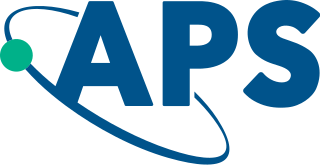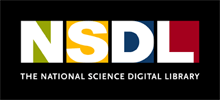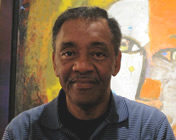
Postgraduate education, graduate education, or grad school, refers to academic or professional degrees, certificates, diplomas, or other qualifications pursued by post-secondary students who have earned an undergraduate (bachelor's) degree.

The National Science Foundation (NSF) is an independent agency of the United States federal government that supports fundamental research and education in all the non-medical fields of science and engineering. Its medical counterpart is the National Institutes of Health. With an annual budget of about $8.3 billion, the NSF funds approximately 25% of all federally supported basic research conducted by the United States' colleges and universities. In some fields, such as mathematics, computer science, economics, and the social sciences, the NSF is the major source of federal backing.

The American Physical Society (APS) is a not-for-profit membership organization of professionals in physics and related disciplines, comprising nearly fifty divisions, sections, and other units. Its mission is the advancement and diffusion of knowledge of physics. The society publishes more than a dozen scientific journals, including the prestigious Physical Review and Physical Review Letters, and organizes more than twenty science meetings each year. APS is a member society of the American Institute of Physics. Since January 2021 the organization has been led by chief executive officer Jonathan Bagger.

The United States' National Science Digital Library (NSDL) is an open-access online digital library and collaborative network of disciplinary and grade-level focused education providers operated by the Institute for the Study of Knowledge Management in Education. NSDL's mission is to provide quality digital learning collections to the science, technology, engineering, and mathematics (STEM) education community, both formal and informal, institutional and individual. NSDL's collections are refined by a network of STEM educational and disciplinary professionals. Their work is based on user data, disciplinary knowledge, and participation in the evolution of digital resources as major elements of effective STEM learning.

The American Society for Engineering Education (ASEE) is a non-profit member association, founded in 1893, dedicated to promoting and improving engineering and engineering technology education. The purpose of ASEE is the advancement of education in all of its functions which pertain to engineering and allied branches of science and technology, including the processes of teaching and learning, counseling, research, extension services and public relations. ASEE administers the engineering technology honor society Tau Alpha Pi.

Science, technology, engineering, and mathematics (STEM) is an umbrella term used to group together the distinct but related technical disciplines of science, technology, engineering, and mathematics. The term is typically used in the context of education policy or curriculum choices in schools. It has implications for workforce development, national security concerns and immigration policy, with regard to admitting foreign students and tech workers.
The Institute for Citizens & Scholars is a nonpartisan, non-profit based in Princeton, New Jersey that aims to strengthen American democracy by “cultivating the talent, ideas, and networks that develop lifelong, effective citizens.” It administers programs that support civic education and engagement, leadership development, and organizational capacity in education and democracy.

The University of Florida Institute of Food and Agricultural Sciences (UF/IFAS) is a teaching, research and Extension scientific organization focused on agriculture and natural resources. It is a partnership of federal, state, and county governments that includes an Extension office in each of Florida's 67 counties, 12 off-campus research and education centers, five demonstration units, the University of Florida College of Agricultural and Life Sciences, three 4-H camps, portions of the UF College of Veterinary Medicine, the Florida Sea Grant program, the Emerging Pathogens Institute, the UF Water Institute and the UF Genetics Institute.

Pramod P. Khargonekar is the Vice Chancellor for Research and Distinguished Professor of Electrical Engineering and Computer Science at the University of California, Irvine. An expert in control systems engineering, Dr. Khargonekar has served in a variety of administrative roles in academia and federal funding agencies. Most recently, he served as Assistant Director for Engineering at the National Science Foundation (2013-2016), and as Deputy Director for Technology at the Advanced Research Projects Agency – Energy. From 2001 through 2009 he was the Dean of the College of Engineering at the University of Florida.
The National Center for Ecological Analysis and Synthesis (NCEAS) is a research center at the University of California, Santa Barbara, in Santa Barbara, California. Better known by its acronym, NCEAS (pronounced “n-seas”) opened in May 1995. Funding for NCEAS is diverse and includes supporters such as the U.S. National Science Foundation, the State of California, and the University of California, Santa Barbara.
The National Science Foundation Graduate Research Fellowship Program (NSF-GRFP) is a prestigious grant awarded annually by the National Science Foundation to approximately 2,000 students pursuing research-based Master's and doctoral degrees in the natural, social, and engineering sciences at US institutions. As of 2023, the fellowship provides an honorarium of $12,000 to be placed towards the cost of tuition and fees at the university the fellow attends; it also awards the student directly with an annual $37,000 stipend for three years, leading to an anticipated total award amount of $147,000.
The America Creating Opportunities to Meaningfully Promote Excellence in Technology, Education, and Science Act of 2007, also known as the America COMPETES Act, was authored by Bart Gordon and signed into law on August 9, 2007, by President George W. Bush. The act aimed to invest in innovation through research and development and improve the competitiveness of the United States.

The Center for Neurotechnology (CNT) is an Engineering Research Center funded by the National Science Foundation to create devices to restore the body's capabilities for sensation and movement. The National Science Foundation has awarded the CNT $~30 million since 2011.
Research Experiences for Teachers (RET) is a National Science Foundation (NSF) program designed to improve science educators by exposing them to research. The program is closely modeled after the NSF Research Experiences for Undergraduates program. Several NSF directorates have their own RET programs including the Directorate of Biological Sciences (BIO), the Directorate for Engineering (ENG), and the Directorate of Computer Information Science and Engineering (CISE). The later two form a joint RET program. Like many NSF programs, the RET program especially encourages the participation of educators from underrepresented groups. In addition, the NSF encourages potential RET host sites to seek out teachers from impoverished school districts.
Bigelow Laboratory for Ocean Sciences, founded in 1974, is an independent, non-profit oceanography research institute. The Laboratory's research ranges from microbial oceanography to the large-scale biogeochemical processes that drive ocean ecosystems and health of the entire planet.
The Nelson Diversity Surveys (NDS) are a collection of data sets that quantify the representation of women and minorities among professors, by science and engineering discipline, at research universities. They consist of four data sets compiled by Dr. Donna Nelson, Professor of Chemistry at the University of Oklahoma during fiscal years (FY) 2002, 2005, 2007, and 2012 through the Diversity in Science Association. These surveys were each complete populations, rather than samples. Consequently, the Surveys quantified characteristics of the faculty which had never been revealed previously, drawing great attention from women and minorities. Furthermore, the Surveys initially came at a time when these underrepresented groups were becoming concerned and vocal about perceived inequities in academia. At the time the surveys were initiated, the MIT Study of 1999, expressing the concerns of women scientists, had just been issued, and underrepresented minority (URM) science faculty noticed URM students increase among PhD recipients without a corresponding increase among recently hired professors. Data sets like the NDS, along with similar research available through the NSF, allowed URM faculty to track the progress of diversity efforts in the STEM fields. As noted by the Women's Institute for Policy Research, progress has been slow for under-represented women in the sciences.
The Center for Undergraduate Research in Mathematics (CURM) is an undergraduate mathematical sciences research skills development program funded by a grant from the National Science Foundation (NSF). CURM is administered by Occidental College in Los Angeles. It has been recognized by the American Mathematical Society as a Program That Makes a Difference. Its stated goals are to promote undergraduate research at colleges and universities throughout the United States.

Milton Dean Slaughter is an American theoretical and phenomenological physicist and affiliate professor of physics at Florida International University. Slaughter was a visiting associate professor of physics in the Center for Theoretical Physics, University of Maryland, College Park while on sabbatical from Los Alamos National Laboratory (LANL) of the University of California from 1984 to 1985. He is also chair emeritus and university research professor of physics emeritus at the University of New Orleans (UNO). Prior to joining UNO as chair of the physics department: He was a postdoctoral fellow in the LANL Theoretical Division Elementary Particles and Field Theory Group (T-8); LANL Theoretical Division Detonation Theory and Applications Group (T-14) staff physicist; LANL Theoretical Division affirmative action representative and staff physicist; LANL assistant theoretical division leader for administration and staff physicist (T-DO); LANL Nuclear and Particle Physics Group staff physicist—Medium Energy Physics Division (MP-4); and LANL Historically Black Colleges and Universities (HBCU) project manager (laboratory-wide).

Brandeis Marshall is an American data scientist, CEO of DataedX, and Full Professor of Computer Science at Spelman College, where she is the former Chair of the Department of Computer and Information Sciences. Starting in September 2019, Marshall is a faculty associate at Berkman Klein Center for Internet & Society at Harvard University. She has also worked to broaden participation in the field of data science to increase representation of underrepresented minorities, including her effort 'Black Women in Data'.

The Department of Defense National Defense Science and Engineering Graduate Fellowship is a prestigious fellowship awarded annually to U.S. citizens pursuing doctoral degrees in science and engineering disciplines. The highly competitive fellowship is sponsored by the U.S. Navy, U.S. Space Force, U.S. Air Force, and U.S. Army. These agencies make the final selection of the fellows. National Defense Fellows must be enrolled in research-based doctoral degrees aligned with the goals of the U.S. Department of Defense as outlined in a specific solicitation for research proposals, known as a Broad Agency Announcement (BAA). Qualifying doctoral programs must be based in the United States. The NDSEG Fellowship lasts for three years, paying for full tuition and all mandatory fees in that period. The fellowship also awards the recipient a monthly stipend, totaling $40,800 annually, a $5,000 travel budget for the 3-year tenure, and a $1,400 annual health insurance budget. National Defense Fellows have no military service obligation upon completion of the program. In the 2020-2021 award cycle, 159 fellows were chosen from a pool of over 7,942 applicants, for a selection rate of roughly 2%.











